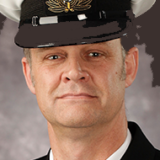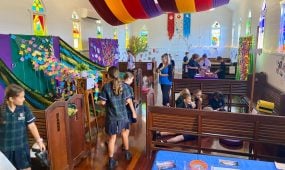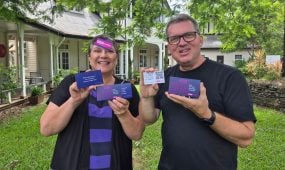Remembering in gratitude and humility
Features
“This year we are encouraged to find other ways of demonstrating our commitment to Anzac Day commemorations. Some communities have suggested standing on our driveways at dawn service and parade times, thus lining the streets of our suburbs in an alternative way, whilst others will undoubtedly use social media to broadcast their personal commemorations,” says Navy Chaplain Fr Stephen Briggs
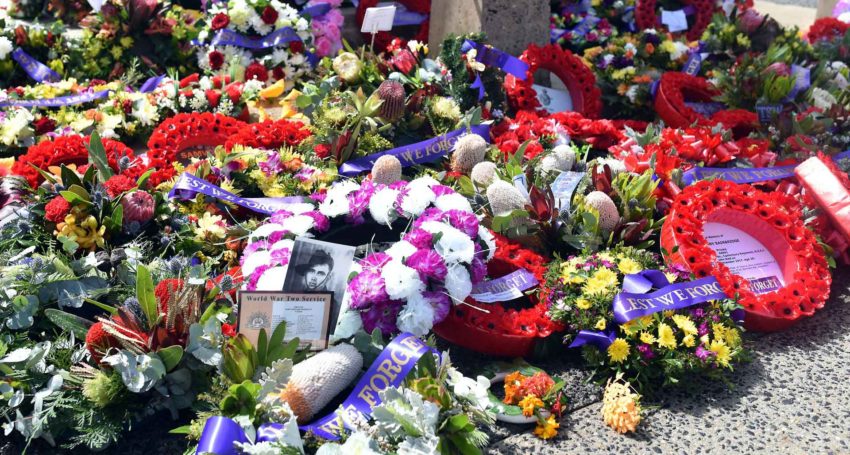
The Anzac tradition, which embraces the ideals of courage, endurance and mateship which are still so relevant today, was established on 25 April 1915 when the Australian and New Zealand Army Corps landed on the Gallipoli Peninsula. On Anzac Day we remember and commemorate the commitment and sacrifice of those who served the Commonwealth and our nation in times of war and conflict. We remember not only those who faced the horrors of battle fronts in trenches, on rocky coastal peninsulas, in jungles and deserts, but also those who served upon and below the tumultuous seas and those who fought exposed in the skies above the battle fronts.
This year Anzac Day commemorations will be considerably different to those of previous years because of the need for people to stay in their homes as much as possible to limit the spread of COVID-19 and keep one another safe. We will not be gathering solemnly at dawn around cenotaphs and shrines of remembrance. Veterans, current service military personnel, support organisations and relatives of veterans will not be marching along streets in Australian and New Zealand cities and country towns. Veterans will not be meeting post-march, which is often the only time of the year they can assemble in commemoration and honour of their common bond.
This year we are encouraged to find other ways of demonstrating our commitment to Anzac Day commemorations. Some communities have suggested standing on our driveways at dawn service and parade times, thus lining the streets of our suburbs in an alternative way, whilst others will undoubtedly use social media to broadcast their personal commemorations. Whatever you decide to do in remembrance this Anzac Day, be assured that those who have served and continue to do so are grateful and humbled by the thoughts and actions of your commemorative commitment.
Advertisement
There have been times when Anzac Day has been viewed and interpreted differently because of changes in the social and political landscapes of the period. However, for those who have served in times of war, conflict, peacekeeping and other government-tasked operations, the memories of their experiences will remain with them, often influencing how they see themselves, others and the world. Many veterans returning from war found that the public expected them to take up their life as they had left it prior to military service. This is rarely the reality, as the lived trauma of war inevitably changes a person’s understanding and interpretation of what is normal and what is not. Today, much more support is accessible and offered as the impact of war on individuals is better understood and managed. The damage sustained by veterans to any one, or a combination, of the physical, mental, emotional and spiritual components which make us who we are is significant and impacts not only the veteran, but their families, friends and broader communities.
During a recent conversation with a veteran of a conflict which was not supported by large sections of the Australian community at the time, it was clearly evident fifty years on, that the effects of war lay just under the outward appearance of this once younger man, conscripted as a soldier in his late teens. For this veteran, who is a man of great faith, the challenges associated with being a veteran are in many ways comparable to that of other veterans. However, he acknowledges and openly testifies that his faith is central in his continuing journey of reconciling and dealing with the personal realities of war.
Advertisement
His personal experience of war and the specific events he witnessed were not part of our conversation, and understandably he does not desire or need for them to be publicised, or worse still ignorantly romanticised. However, those things which are a healing balm to the injured soul were discussed. Friendship, love and support, a listening ear, empathy and compassion, forgiveness, a sense of belonging, personal presence, community – these are some of the human qualities and longings sought by those who have experienced war and are essential for their possible and hopeful return to wholeness of life.
Unsurprisingly, we all need to be able to freely give these things of ourselves in order to receive the same in return. Veterans, through their war experience or homecoming, can feel or be made to feel as if they do not belong, that they are disconnected, unrecognised and not valued as a person. No one ever wants to feel that way. This is not how God created us or wants us to be. We are born and live in relationship with God and each other, and there is a continuing desire for wholeness within each of us, no matter our life experience.
This Anzac Day as we continue to face the challenges of COVID-19, we could all draw on those things which make the ‘Anzac Spirit’ so revered. Courage, endurance and mateship, so often demonstrated in times of war, are also attributes which will help us as communities, as a nation and citizens of the world to overcome the devastating effects of the virus sweeping the globe. Be mindful this Anzac Day that it is not a day of celebration, but a day of commemoration. A day during which we remember in gratitude and humility those who sacrificed so much for the freedom we often take for granted.
Anzac Day Prayer
God of love and liberty,
we bring our thanks today for the peace and security we enjoy.
We remember those who in time of war faithfully served their country.
We pray for their families,
and for ourselves whose freedom was won at such a cost.
Make us a people zealous for peace, and hasten the day
when nation shall not lift up sword against nation
neither learn war anymore.
Related Story
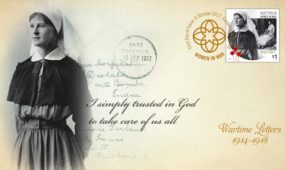 Features
Features
Sister Ella McLean: Queenslander, Anglican and WWI nurse
This we pray in the name of the one who gave his life for the sake of the world:
Jesus Christ, our Redeemer. Amen.
Editor’s note 23 April 2020: RSL Queensland has called on the community to stand on their driveways or balconies at 6am on Saturday 25 April to observe a minute’s silence. Readers may also join in the official Anzac Memorial live-streamed service on Facebook at 10am on Anzac Day. The live-streamed service will be led by The Right Rev’d Grant Dibden, Anglican Bishop to the Australian Defence Force (please see the anglican focus Events page for more information).

